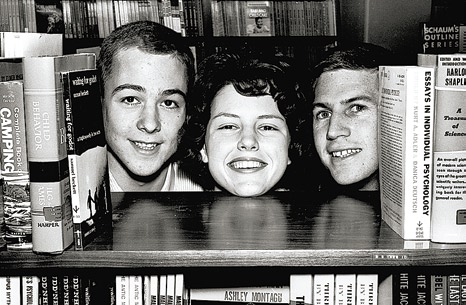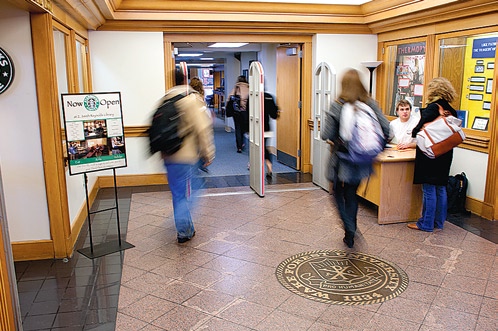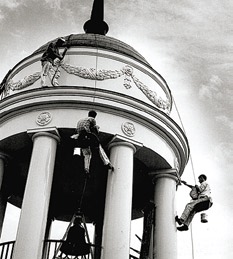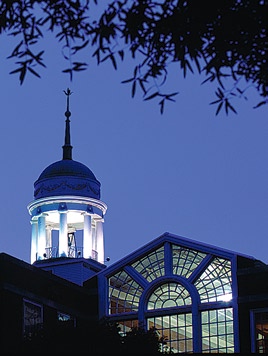Earlier this year, the Z. Smith Reynolds Library received the 2011 Excellence in Academic Libraries Award, given annually by the Association of College and Research Libraries, a division of the American Library Association. Maria Henson (’82) of Wake Forest Magazine talked with the library’s dean, Lynn Sutton, about how the library garnered the award and why ZSR is the place to be on campus. Its special collections include N.C. Baptist history and manuscripts of such luminaries as former Esquire editor Harold T.P. Hayes (’48) and Wilbur J. Cash (’22), author of “The Mind of the South.” Following are edited excerpts from the conversation.

Lynn Sutton: “Our role in society is to see the future.”
Congratulations. Tell me about the award.
I jokingly said it was the NCAA championship for libraries. The usual winners are big research libraries.
For example?
Last year’s winner was Indiana University. Year before that was Minnesota. Previous winners were Cornell, Virginia, N.C. State, Georgia Tech. For us to compete at that level and come out on top, it’s really a testament to everyone here. I was pleased to see that the awards committee recognized that a smaller library could make contributions at the same level as some of the other libraries, just in different ways. They said where we stood out is that our mission is so closely aligned with the mission of the University. The mission of the Z. Smith Reynolds Library is to help our faculty and students succeed.
Usually library missions are ‘We’re going to select, collect, acquire, organize (and) provide access to print and digital resources.’ Our mission: We completely flipped it around. And what we say is, ‘It’s all about you. It’s all about you, the user.’
The first year I got here (students) came to me and said, ‘Could you possibly extend the hours to 1 a.m.?’ They were very timid about asking me that, and I said, ‘Sure. If that’s what you think you need.’ We said it’s not about us and when we want to work. It’s about the students and when they need to come in and study. So we changed the hours so that we’re open 24 hours, five days a week. It started this back and forth, very comfortable relationship with the student body here, unlike I’ve ever seen at any other university.
 Tell our readers about games like Capture the Flag happening here.
Tell our readers about games like Capture the Flag happening here.
The way I put it is we love our students, and our students love us. And they can come to us with a wacky idea, and they won’t be turned aside. Our motto is to think of a way to say yes before you have to say no.
There are things happening here that are very social.
A couple of years ago I did a research study with my colleague from UNC Greensboro to see essentially why students use the library. What is important to students about the library? What is the library brand? There had previously been a (national) study saying globally what is the library brand; and the answer to that — which is probably about four years ago — was that books are still the library brand. When you go to the person on the street in Seattle or in Germany (and ask) what do you think of when you think of a library? They say books. But we replicated the study with our students here at Wake Forest and at UNCG, and what we found was the students — they want a quiet place to study, they want people to help them as they go about their work — and it was more about the place. And it was about their experience in the place as opposed to the products. That was very enlightening. What I tell people when they ask why do students come to the library when they could study in their dorm or when they could study anywhere else, it is because they want to feel surrounded by people who will help them if they need help. It’s a real comfort to know I’m here in the atrium, I have my laptop open, I have my textbook, but if I need anything I know there’s somebody on the fourth floor who’s going to help me.
 What is the attendance?
What is the attendance?
The daily attendance last year went from 1,765 to 1,939. But look at the website daily visits. We have more people visit us virtually than (in person).
Visitors to Starbucks — do they count?
I hope so. That was our hidden agenda. I wanted Starbucks because library directors across the country told me the single brand that will bring people to your building is Starbucks. First of all, there’s a good match between books and coffee or reading and coffee, right? And libraries have pretty much lost the fear of spills. (Laughing.) Our food policies have pretty much loosened up so we will accept people eating and drinking. Our goal was to bring people into the library, and Starbucks did that. Soon after we opened we did a study and learned that 10 percent of the people who come through the front doors go only to Starbucks and then leave. But overall our attendance has increased by about 10 percent within the library, not just at the library door.
The other thing we wanted to do was also a spectacular success, which was get students, faculty, families, parents, everybody together in one place. Besides getting more people in the library, one of the things was to provide a place for people to be in community together. And from that first day, it happened. The president meets with students in Starbucks. Every campus visit ends in the library, and families go out in Starbucks. All you have to do is walk in there today, and you will see a cross-section of the University, and that’s very gratifying.
In my day we had the Zoo. It was downstairs and the only place you could talk and maybe take a Diet Coke. Is there even a Zoo anymore?
No, there’s not a Zoo anymore.
The whole library can be the Zoo!
(Laughing). Well, when I first started (in 2004), we had a guard at the front door, and he inspected you to see if you had any liquids on you. And I went to the staff after about a year, and I said, ‘Let’s talk about this. Do you want to really continue keeping all those students out and all those drinks out?’ And they said, ‘No.’ What we’ve gained is the trust and gratitude of our students, which in turn has contributed to the whole relationship we have with them.
What should readers know about special collections?
First of all, anything I said about a relaxed food and drink policy doesn’t apply to special collections because this is one area where we do have unique things. Having the only copy of one thing in the entire world gives you a certain responsibility, and that responsibility is to preserve it in the format it was originally created. We have very rich special collections. We haven’t been as showy about them as some other universities. We are trying very hard now to organize it internally and, to the extent we can, present it externally and have more people know about it.
 In the bricks and mortar sense, are libraries here to stay?
In the bricks and mortar sense, are libraries here to stay?
I think ours is for at least the foreseeable future because we have seen our attendance rise in the last five to 10 years and because we go beyond just the product and concentrate more on the experience.
 Do you think you will see less space devoted to ZSR’s tangible products?
Do you think you will see less space devoted to ZSR’s tangible products?
Yes, that I do. That is a natural outcome of the digitization of information. The primary format for journals is digital. Monographs, however, are a much different animal. And in the last year or two e-readers have gotten traction finally. In the early days people tried to guess what is the platform that will succeed. And we as librarians said platforms will come and go; readers will come and go; people’s preferences will be different, so it’s our job to make the content available in whatever form that people want to read it.
We have seen in this library — reluctance might be too strong of a word — but there has not been a groundswell for us to acquire e-books, but we as librarians see that that is the future. So many times we feel that our role in society is to see the future and help people move along.

